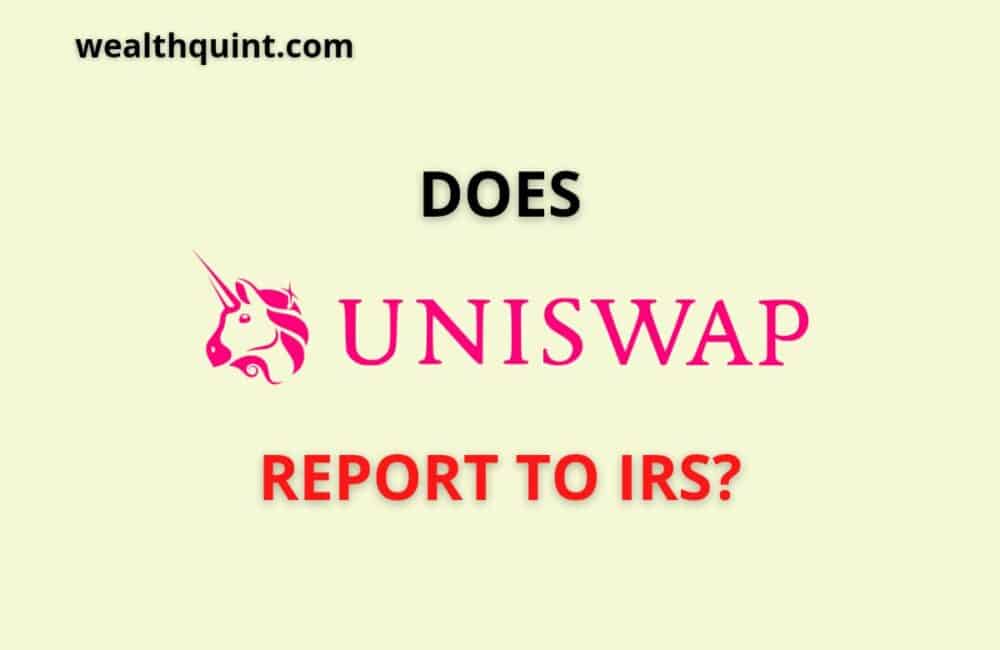Uniswap is indeed the buzzword in the newly emerging cryptocurrency space. Its functionalities are dual – as it serves as both a cryptocurrency as well as a decentralized exchange.
The platform is built on the top of Ethereum and through the use of smart contracts, users can swap and trade ERC-20 tokens. Note that only tokens based on Ethereum are supported and the decentralized exchange uses this blockchain for transactions.
The traders have to sign smart contracts before depositing their crypto assets. According to a source in CoinGecko, Uniswap has 2441 trading pairs and 1852 different types of coins supported.
Does Uniswap Report To IRS?
Uniswap may or may not report to IRS because Uniswap had not made it explicit if it directly reports to the IRS like Coinbase, Kraken, etc. which actually does.
To put it clearly, as per law, all crypto to crypto trade where there is a gain and crypto to fiat transactions are all subject to taxes. Therefore, all trades on Uniswap are subject to taxes.
The majority of tax organizations across the world including the IRS have not yet fully understood or monitored DeFi protocols like Uniswap.
That means there are still no clear guidelines specifically for platforms like Uniswap; however, the tax payment on gains remains applicable. As of now, we just need to use the existing crypto laws and extend the same to DeFi as well.
How To File Taxes With Uniswap?
In order to get started with Uniswap taxes, you first need to know your transaction history within the taxable period. Roughly, there are two ways in which you can achieve this:
You can connect the wallet that you have linked to UniSwap to further link to a crypto tax software that will automatically do the calculations for you.
Take the public address of the ETH wallet from Uniswap and input it on the crypto tax software like Koinly, Cryptotrader.tax. This will import all your transactions, and calculate your capital gains, income and losses.
Else, you can do it manually. But note that, unlike Trust Wallet, you cannot download CSV files from Uniswap. But you can log in to your wallet separately through its respective app (for example, Coinbase, Metamask, etc) and download the transaction history from there.
Another way is to use services like Etherscan through which you can obtain the transaction history of Uniswap (by inputting your ETH wallet public address). Using this CSV table, you may manually calculate your crypto taxes.
Does Uniswap Give Tax Documents?
No, the platform does not provide any form of tax forms or tax documents to the users. Neither do they give any sort of financial statement? It is your obligation to obtain the relevant tax forms from the authorities where you need to mention your crypto-financial history.
For What All Do You Pay Taxes On Uniswap?
The platform can enable you to do a lot of things but will tax be applicable on all or each of them? This table must help you.
| Activity | Report Taxes (Yes/No) | Reason |
| Trades | Yes | This is the conventional crypto tax law, where you have to pay taxes on the capital gains |
| Adding or removing Liquidity | Yes (but no clear guidelines yet) | Since you get a liquidity pool token when you add/remove liquidity, it may be subjected to the crypto to crypto tax. However, the IRS does not provide clear rules on this and it is suggested to get in touch with a tax expert. |
| Flash Swaps | Yes | Although there are no capital gains from this, it is deemed as a crypto to crypto trade and is, therefore, taxable |
| Staking Tokens (UNI or Uniswap Liquidity Pool Tokens) | Yes | Whether you receive a lump sum in return for staking, you need to pay capital gains tax. If you are earning new tokens by staking your tokens, you have to pay tax similar to crypto to crypto trade. |
How Do Cryptocurrency Taxes Work?
Do remember that cryptocurrency is still in the nascent stage and the IRS is working hard to enforce consistent and acceptable cryptocurrency tax guidelines.
According to the government rules, you are supposed to pay taxes on crypto. They consider cryptocurrency as an asset (or property) and accordingly, similar rules apply.
When you dispose of, sell or trade cryptocurrency, you would need to pay tax on the gain. For instance, you have got a cryptocurrency at $10000 and you sell it at $15000, you need to pay tax on the $5000 gain.
On the other hand, if you do report a loss when you dispose of cryptocurrency, you can have that deducted from your losses. Also, note that buying cryptocurrency is not a taxable event. Even if the value of the coin increases, you can buy and hold them without paying any taxes.
The IRS has been actively participating in this space so that investors pay their crypto taxes effectively. On form 1040, cryptocurrency owners must answer if they have had any virtual currency transactions during that year.
On the other hand, according to Forbes, cryptocurrency exchanges provide you with Form 1099-K if you had more than 200 transactions and have more than $20000 in training in that fiscal year.
Conclusion
Therefore, these are the simple guidelines for paying your crypto taxes if you operate Uniswap. Watch out for the official IRS space to become aware of upcoming rules.

